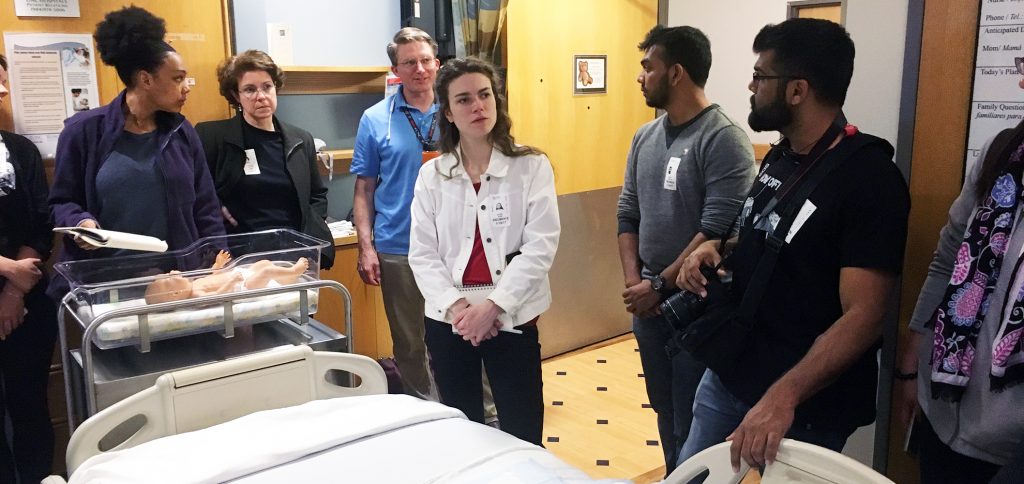Tully hopes to serve mothers, infants with innovative new bassinet
March 28, 2018

Dr. Kristin Tully
Years ago, Kristin Tully, PhD, began her research into mother-infant interactions. Her first study on nighttime infant care found that “side-car” bassinets, which attach to the side of a hospital bed, greatly improved the mother-newborn experience during postpartum hospitalization and reduced safety risks for infants. While some hospitals around the globe have adopted these innovative bassinets in their maternity wards, there is limited capacity to better serve new families in United States postnatal units.
That is about to change, however. By 2020, Tully and colleagues expect to have a fully tested, federally approved version available for the U.S. market.
With the standard of healthcare evolving to recommend that healthy newborns share a room with their mother post-delivery, hospitals must ensure that mothers are able to safely transfer their babies to and from a bassinet for feeding, sleeping and other care.
Tully, a research associate with the Carolina Global Breastfeeding Institute in the Department of Maternal and Child Health at the University of North Carolina at Chapel Hill’s Gillings School of Global Public Health, explained that some new mothers initially are physically unable to get out of bed without assistance, while others have difficulty handling their baby due to the high walls of existing bassinets. Both these circumstances convey undue strain on mothers and increase the risk of infant falls. Additionally, when nurses are called upon to help with the minor but vital task of infant handling, it means their attention is taken away from other patients on the ward.
In order to address this pain point, Tully spearheaded an innovative partnership.
In 2016, she applied for funding from the North Carolina Translational & Clinical Sciences Institute (NC TRaCS) at the University of North Carolina at Chapel Hill; the bassinet team received the highest level of NC TRaCS support in the form of an Improving Human Health Award. The award funded a project to design and develop infant bassinets specifically for use in hospital postnatal units.
“Current U.S. bassinets are designed for a nurse to access the baby while standing, instead of supporting the mom who is interacting with her baby from a bed,” Tully said. “That’s the foundational mismatch. Postnatal units are lacking innovation to optimally accommodate mother-newborn needs. If you have to get out of bed to safely access your baby, that’s a barrier to maternal recovery and wellness. We can do better.”
To facilitate this improvement, Tully has collaborated with a team of investigators from across UNC departments, including Catherine Sullivan, MPH, director of the Carolina Global Breastfeeding Institute at the Gillings School; Carl Seashore, MD, associate professor of pediatrics at the UNC School of Medicine; and Alison Stuebe, MD, Distinguished Scholar in Infant and Young Child Feeding at UNC Gillings and associate professor of maternal-fetal medicine at the School of Medicine.

Collaborators on the sidecar project visit a hospital maternity room. (Contributed photo)
First, the team conducted a large survey of healthcare providers and new parents to inform the bassinet development. The next step in the human-centered design project was a collaboration with North Carolina State University’s School of Design. Tully identified industrial design faculty and students with the skillset needed to create bassinet prototypes.
“We had initial discussions, and that’s exactly what they do – design medical devices and other products to fulfill unmet needs,” Tully said. “We engaged with N.C. State by presenting the research, discussing clinical needs, challenges and regulations, and providing a list of things we’d like to see. They made great strides with prototype design.”
The NC TRaCS award funded a semester-long course for 10 industrial design graduate students, who were excited to have an opportunity to create something with a potentially significant impact for families, and to witness an immediate change that could establish a shift in maternity care for generations to come.
“[The] goal was to get this idea out of [Kristin’s] head and into the market, so that it would solve a problem for the patients,” said Sharon Joines, PhD, professor and director of the graduate program in industrial design at N.C. State.
Throughout the semester, the students made observations to inform their design. They examined infant bassinet use in relation to a maternity bed in a hospital. They brought a standard bassinet and a hospital bed from the North Carolina Women’s Hospital in Chapel Hill into their on-campus studio in Raleigh so they could work directly with the equipment in question while developing and evaluating their prototype designs. They also invited healthcare providers and new parents to the studio so these key stakeholders could generate their own ideas about the project and collaborate on design refinement.
After months of highly iterative work, the students presented prototypes to the UNC investigators, Tully’s business advisors from the Blackstone Entrepreneurs Network and designers from Trig Innovations, a marketing and industrial design firm based in Chapel Hill. Together, the partners agreed on the best components and worked together to create a design that incorporated them all.
Tully named the prototype the “Couplet Care BassinetTM” to emphasize that it is designed to serve mother-baby dyads together. The UNC Office of Commercialization and Economic Development has submitted a provisional utility patent application for the bassinet, and consultations with national maternity healthcare leaders and in-person feedback from mothers has both identified strengths and generated ideas for further refinement. Now, Tully is focusing on obtaining funding for the design updates, safety testing to federal standards, multi-site clinical trials and implementation support.
Tully said she expects that the bassinet will be licensed and on the market in the near term. The Carolina Global Breastfeeding Institute already is being contacted by U.S. and foreign hospitals who are interested in the innovative product.
The original version of this article was written by Phillip Ramati of North Carolina State University.
Gillings School of Global Public Health contact: David Pesci, director of communications, (919) 962-2600 or dpesci@unc.edu
